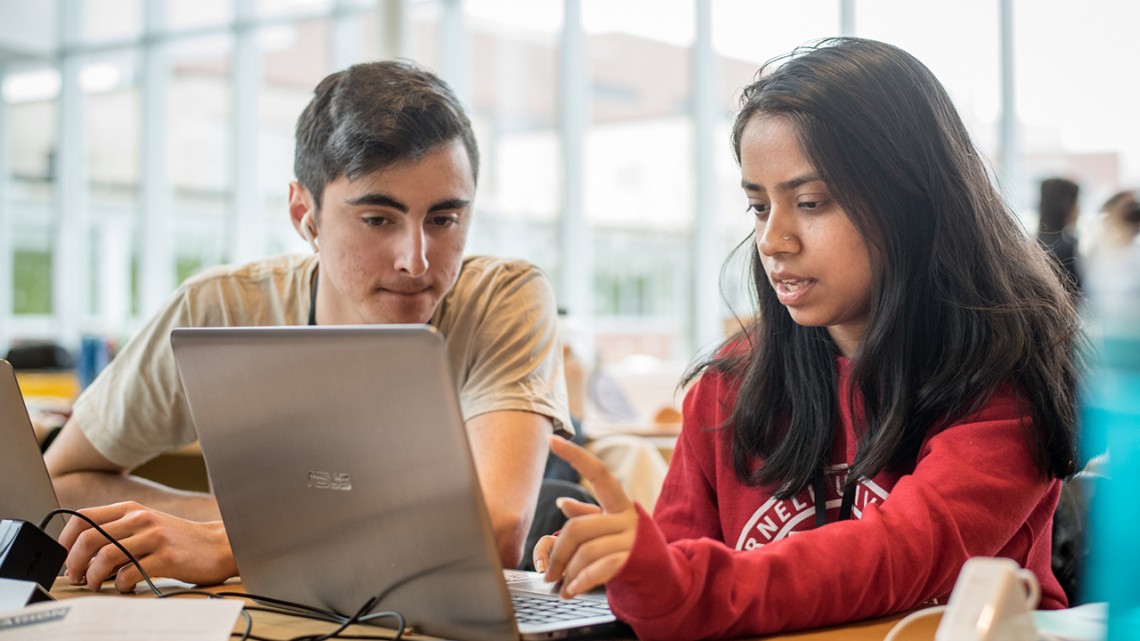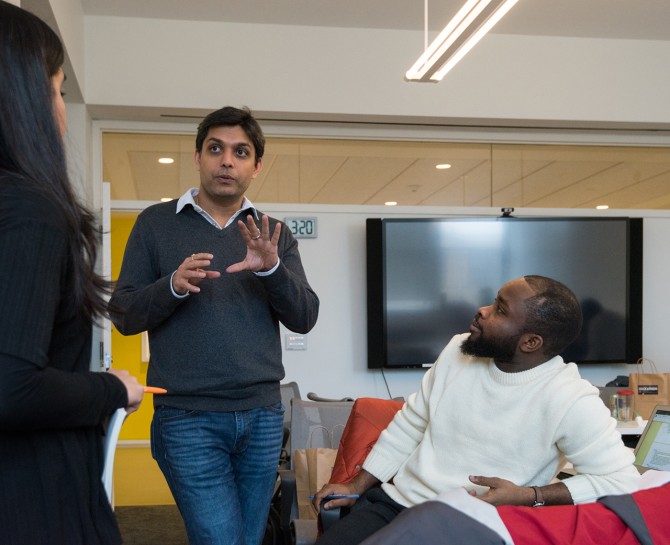
Alex Vaziri '22, left, and Faima Quadir ’22 participate in Cornell’s inaugural Digital Agriculture Hackathon in the Schurman Hall atrium.
Digital Ag Hackathon tackles pressing agricultural problems
By Kelsey O’Connor
Cornell’s first Digital Agriculture Hackathon, held March 1-2, offered a glimpse of what the future of agriculture could hold. Over the course of 36 hours, approximately 140 students from a wide range of disciplines – from computer science to engineering to animal health to public health – came together to find innovative solutions to some of the world’s most pressing agricultural problems.
To feed the growing population of the world, food production needs to increase by 70 percent by 2050. But as Ranveer Chandra ’05, chief scientist at Microsoft Azure Global, explained at the hackathon, it’s not enough to just produce more food.
“The thing is, it’s not just feeding the world. You have to nourish them,” Chandra said. “You have to give them not just food, but good food, and you have to do this in a sustainable way without harming the environment, which makes it even more challenging because you need to grow more food, but the water levels are going down. The soil is not getting any better. How are you going to grow more food without harming the planet? That’s the challenge that all of us need to get together to solve.”
The hackathon marked the first student-focused effort since the recent launch of the Cornell Initiative for Digital Agriculture and was sponsored by Microsoft, BASF, Cargill, GRO-Intelligence, Dairy One, Dairy Farmers of America and Insight.
The event was led by Steven Wolf, associate professor of natural resources in the College of Agriculture and Life Sciences, and Hakim Weatherspoon, associate professor of computer science.
Wolf said the hackathon was a chance to engage student energy from CALS, Cornell Engineering, the College of Veterinary Medicine, and Computing and Information Science in an integrated way.
“Advances in engineering are driving down the costs of data acquisition,” Wolf said. “At the same time, advances in machine learning and artificial intelligence create new capabilities. All of this is happening in the context of mounting concern about the environmental implications of contemporary agriculture, the capacity to provide nutrition to a growing population and concern about the availability of labor and existing models of production and provision of food.
“Out of this,” he said, “we have a new conversation about how to integrate new technologies into agriculture in ways that allow us to respond to a set of pressing social, economic and ecological problems. That’s what makes digital agriculture exciting.”
As the nearly 140 participating students on 28 teams learned at the hackathon, when the field of agriculture or animal health meets computer science, engineering and business, creative ideas emerge.
After hours of coding, design, research and business planning, 26 teams presented their demos. Ten teams were named finalists, and five teams won prizes. Each team’s proposed solution received a score based on data collection and analysis, novelty, social impact and market-readiness.
The top prize for highest overall score, worth $2,000, went to InsectInsights for its product that allows fish farmers to grow their own fly larvae to feed their fish instead of buying fish meal. Users are provided with “love cages” – where adult flies mate – and boxes for the larvae to grow in. The group, comprising students studying business, computer science and food science, also demonstrated a mobile app to connect fish farmers with local food producers.
Team member Cynthia Istanto ’20 said they wanted to solve the problem of the increasing demand for fish feed, and said they thought an insect-based product would be a good substitute. “Technology plays a big role in this because insect-based feed does not exist in the supply chain yet,” she said, “so for us to really scale this solution, we can use technology to empower small farmers.”
Between the number of students who participated, the quality of engagement, and the diversity and strengths of the ideas and solutions pitched at the hackathon, Wolf counts the event a success.
“For students that participated, we hope the hackathon creates a path for them to deepen their engagement and take their ideas forward. For CIDA, I hope it creates energy to advance relationships on and off campus,” Wolf said.
Kelsey O’Connor is a freelance writer for the College of Agriculture and Life Sciences.
Media Contact
Get Cornell news delivered right to your inbox.
Subscribe


